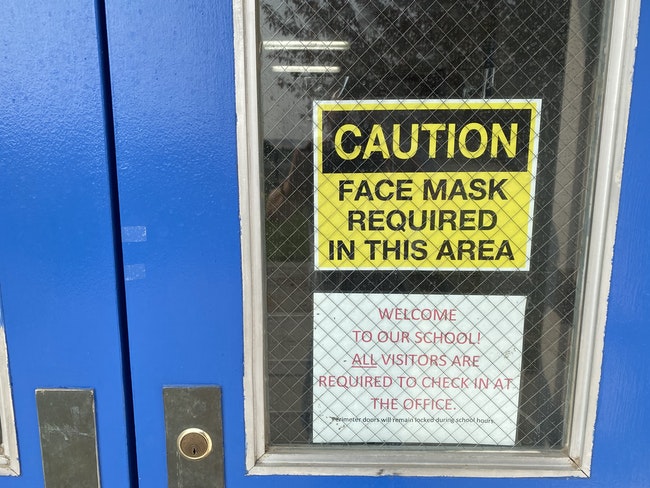
All workers in Oregon are now required to wear masks indoors even if they stay 6 feet away from others, the Oregon Health Authority announced Monday.
The new rules require anyone in a public or private workplace to wear a mask or face covering. Masks also must now be worn in classrooms and meeting rooms. The only exception is when someone is “alone in an office or private workspace,” the guidance said.
The change comes with a growing scientific consensus that the coronavirus can spread via aerosol, smaller particles of fluid that can linger in the air and travel farther than 6 feet.
It also follows fresh warnings by health officials that the numbers of people infected with Covid and requiring hospital treatment were rising in Oregon. The state Monday reported 266 new cases, bringing the Oregon total to 39,794, and 8 deaths. Marion County reported 39 new cases and Polk County 3.
OHA officials said no one factor caused the tighter mandate, but pointed to the role of airborne spread in response to a question from Salem Reporter.
“We have consistently changed various guidance to reflect the latest understanding of risk factors for COVID-19 transmission. This guidance is no different; we’ve updated it to reflect our understanding of how to keep people safer from a virus that has both droplet and airborne spread, especially in indoor environments,” according to an email from Dr. Shimi Sharief, a senior health advisor with OHA.
The change doesn’t apply to restaurants and bars, where customers may still remove masks to eat or drink.
People must now also wear masks at indoor or outdoor markets, street fairs, private career schools and public and private colleges and universities. Many such locations had already implemented similar rules, including the Salem Saturday Market.
Workplaces have been a significant source of Covid spread in Oregon, particularly at food processing and manufacturing facilities and warehouses. OHA’s public reporting of workplace outbreaks has included few office environments, though that likely reflects the fact that many office workers are still working from home.
The state made no major announcement of the new requirement, which affects every office in the state. Instead, the new guidelines were included as part of the state agency’s daily announcement of new Covid cases on Monday, Oct. 19.
Unlike other pandemic requirements, the new guidelines weren’t announced during a press conference or separate press release. It’s not clear what kind of outreach the state officials had done with the business community prior to releasing the guidelines. Charles Boyle, spokesman for Gov. Kate Brown, said the governor’s office and OHA “regularly communicate with the business community about guidance changes so that business owners can make adjustments to their protocols and help to protect Oregonians from the spread of COVID-19.”
OHA also recommended Monday that Oregonians opt for face masks, not face shields, “except in limited situations when a face shield is appropriate such as when communicating with someone who is deaf or hearing impaired and needs to read lips.” Though face shields reduce the spread of larger droplets that can carry the virus, research shows they’re less effective against aerosol particles.
“Beyond these guidelines, people should understand that the more strict they are about face covering use and the more they combine that with other recommendations like staying distant and avoiding gatherings, the safer they can be,” Sharief said.
Since the pandemic began, Oregon has taken a heavier hand than some states in use state orders to prevent the spread of Covid, but enforcement has been more lax. Oregon’s Occupational Safety and Health Administration had issued citations to 18 businesses as of mid-September for violating health regulations related to Covid after receiving thousands of complaints statewide.
GET YOUR LOCAL NEWS FROM REAL PROFESSIONALS: Reader support allows the Enterprise to provide in-depth, accurate reporting that otherwise would not get done. Keeping the community well informed is essential. SUBSCRIBE – $5 a month, automatically. DONATE – to provide additional support.




